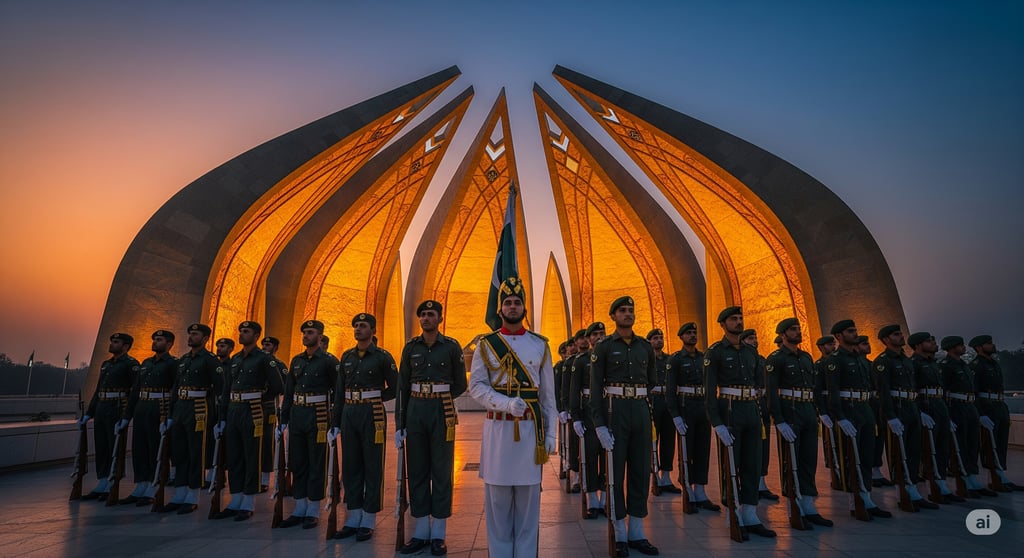PDF Tools, Image Tools, Utility Tools, Web Apps, Games, Blogs, Indian Bank IFSC codes, Indian Post PIN Codes and more…https://www.allwebapps.com/
The Sword of the Crescent: A Deep Dive into Military Management in Pakistan
The Pakistan Armed Forces are a significant and influential institution within the country, possessing a well-defined structure, extensive responsibilities, and a complex relationship with the civilian government. Understanding its management requires examining its organization, its role in national security, its economic activities, instances of political interference, and the delicate balance of power with civilian authority.


The Sword of the Crescent: A Deep Dive into Military Management in Pakistan
The Pakistan Armed Forces are a significant and influential institution within the country, possessing a well-defined structure, extensive responsibilities, and a complex relationship with the civilian government. Understanding its management requires examining its organization, its role in national security, its economic activities, instances of political interference, and the delicate balance of power with civilian authority.
I. A Hierarchical Structure with Joint Capabilities: The Organization of the Pakistan Armed Forces
The Pakistan Armed Forces are a professional military organized into three main service branches and a number of inter-service organizations. The command structure is hierarchical, ultimately reporting to the civilian leadership, although the dynamics of this relationship are unique to Pakistan.
The Joint Chiefs of Staff Committee (JCSC):
At the apex of the military structure is the Joint Chiefs of Staff Committee.
Composition: The JCSC is chaired by a senior military officer (usually rotated among the three services) and comprises the Chairman JCSC, the Chief of Army Staff (COAS), the Chief of Naval Staff (CNS), and the Chief of Air Staff (CAS).
Functions: The JCSC is the highest forum for inter-services coordination and advises the civilian government on strategic and operational military matters. It is responsible for formulating joint military doctrines, assessing military preparedness, and overseeing joint military operations.
The Service Branches:
Pakistan Army: The largest branch, responsible for land warfare and maintaining internal security. It is organized into corps, divisions, brigades, and smaller units, with a strong presence across the country. The Chief of Army Staff (COAS) holds a particularly influential position.
Pakistan Navy: Responsible for maritime defense, safeguarding Pakistan's sea lanes, and protecting its exclusive economic zone. It operates surface fleets, submarines, and naval aviation. The Chief of Naval Staff (CNS) commands the Navy.
Pakistan Air Force (PAF): Responsible for air defense, offensive air operations, and providing air support to ground and naval forces. It operates a fleet of fighter jets, transport aircraft, and helicopters. The Chief of Air Staff (CAS) commands the Air Force.
Inter-Services Organizations:
Several organizations operate under the joint command and coordination of the JCSC, including:
Inter-Services Intelligence (ISI): The primary intelligence agency, responsible for external and internal intelligence gathering and analysis. It holds significant influence and has been a subject of both national pride and international scrutiny.
Strategic Plans Division (SPD): Responsible for the security and control of Pakistan's nuclear arsenal.
Frontier Corps (FC): A paramilitary force operating in the western and northwestern border regions, assisting in border security and counter-insurgency operations. While under the Ministry of Interior in peacetime, it falls under Army control during conflict.
II. Guardians of the Nation: Responsibilities of the Pakistan Armed Forces
The Pakistan Armed Forces are constitutionally mandated to defend the country and have assumed broader responsibilities over time.
Defending Territorial Integrity and Sovereignty: The primary responsibility is to protect Pakistan's borders from external aggression and maintain its sovereignty. This is a constant focus given the complex regional security environment.
Maintaining Internal Security: The military has often been called upon to assist civilian authorities in maintaining law and order, particularly during periods of political instability, sectarian violence, or natural disasters. They have also played a significant role in counter-terrorism operations, especially in the western regions.
Supporting Foreign Policy Objectives: The military's capabilities and strategic positioning are integral to Pakistan's foreign policy, influencing its relationships with neighboring countries and major global powers.
National Development and Disaster Relief: The armed forces often contribute to national development projects, infrastructure building, and provide crucial assistance during natural disasters like earthquakes and floods.
III. The Shadow of Influence: Interference in Civilian Government Activities
The relationship between the military and civilian government in Pakistan has been historically complex and often marked by military interventions and significant influence behind the scenes.
History of Military Coups: Pakistan has experienced several successful military coups, leading to prolonged periods of direct military rule. This history has deeply shaped the political landscape and the perception of the military's role.
Extra-Constitutional Influence: Even during periods of civilian rule, the military has often been perceived to wield significant influence over key policy areas, particularly foreign policy, defense, and internal security. This influence can manifest through formal consultations, informal pressures, or the perceived threat of intervention.
Economic Interests: The military has significant economic holdings and interests in various sectors, which can create a degree of autonomy and influence over economic policies. These interests are often managed through welfare foundations and other organizations.
Public Perception and Legitimacy: The military enjoys a high level of public support and is often seen as a more stable and efficient institution compared to civilian political structures. This public perception can inadvertently lend weight to its views and influence.
IV. Economic Entanglements: Generating Own Incomes
The Pakistan Armed Forces, like many large military organizations globally, engage in various economic activities to support the welfare of their personnel and contribute to national development (as they perceive it). However, the scale and scope of these activities in Pakistan are often a subject of debate.
Welfare Foundations: The military operates large welfare foundations (e.g., Fauji Foundation, Army Welfare Trust, Bahria Foundation, PAF Welfare Trust) that run a diverse range of commercial enterprises, including manufacturing, agriculture, real estate, banking, and education.
Land Holdings: The military controls significant tracts of land across the country, often allocated for military use, housing schemes for personnel, or agricultural projects.
Commercial Ventures: The welfare foundations operate numerous businesses, generating revenue that is often reinvested in welfare projects for serving and retired military personnel and their families.
Arguments for and Against: Proponents argue that these ventures contribute to the welfare of military personnel, create employment, and contribute to the national economy. Critics argue that they create an unfair competitive advantage, lack transparency and accountability, and can potentially lead to conflicts of interest with civilian economic policies.
V. A Delicate Balance: Fear and Safety Precautions of the Civilian Government
Given the history of military interventions and the perceived influence of the armed forces, civilian governments in Pakistan have often navigated a complex and sometimes precarious relationship.
Respecting Institutional Boundaries (Publicly): Civilian leaders generally publicly express respect for the military and its role in national security. Open criticism or confrontation is often avoided to prevent friction.
Strategic Appointments: The appointment of key military leaders, particularly the Chief of Army Staff, is a crucial decision for the civilian government. Efforts are often made to appoint individuals perceived to be supportive of constitutional rule.
Maintaining Budgetary Control (in theory): While the military has significant budgetary allocations, the civilian government is constitutionally responsible for approving the defense budget. However, the process can lack transparency, and the military's needs often carry significant weight.
Strengthening Democratic Institutions: Efforts to strengthen civilian institutions, the rule of law, and democratic processes are seen as long-term safeguards against military overreach. A more robust and legitimate civilian political system can better assert its authority.
Seeking Public Support: Civilian governments often try to build public support for democratic norms and civilian supremacy to counter any potential moves towards military intervention.
International Pressure: International actors and democratic allies can sometimes play a role in supporting civilian rule and discouraging extra-constitutional actions.
Informal Negotiations and Consensus-Building: Often, the relationship is managed through informal channels of communication and consensus-building between civilian and military leaders on key policy issues.
VI. Everything to be Covered: A Summary of Key Aspects
Constitutional Role: The Constitution of Pakistan outlines the role of the armed forces in defending the nation, but the interpretation and implementation of this role have evolved over time.
Civil-Military Relations: This remains a critical and often sensitive aspect of Pakistan's political landscape, characterized by periods of cooperation, tension, and direct military rule.
Modernization and Capabilities: The Pakistan Armed Forces are continuously working to modernize their equipment, training, and doctrines to meet evolving security challenges.
Regional Security Environment: Pakistan's geostrategic location and complex relationships with neighboring countries significantly influence the military's posture and responsibilities.
Nuclear Deterrence: The military plays a central role in maintaining and safeguarding Pakistan's nuclear arsenal, a critical component of its national security strategy.
Public Trust and Accountability: While enjoying high public trust, there are ongoing debates about the need for greater transparency and accountability of the military, particularly regarding its economic activities and influence on policy.
The Future of Civil-Military Balance: The trajectory of civil-military relations in Pakistan will continue to shape its political future. Strengthening democratic institutions, promoting dialogue, and establishing clear constitutional boundaries are crucial for a stable and prosperous Pakistan.
In conclusion, the management of the Pakistan Armed Forces is a multifaceted issue encompassing a strong organizational structure, broad responsibilities, significant economic interests, a history of political influence, and a delicate relationship with the civilian government. Understanding these dynamics is essential for comprehending the complexities of Pakistan's political and security landscape. The ongoing evolution of civil-military relations will continue to be a defining factor in the country's future.
